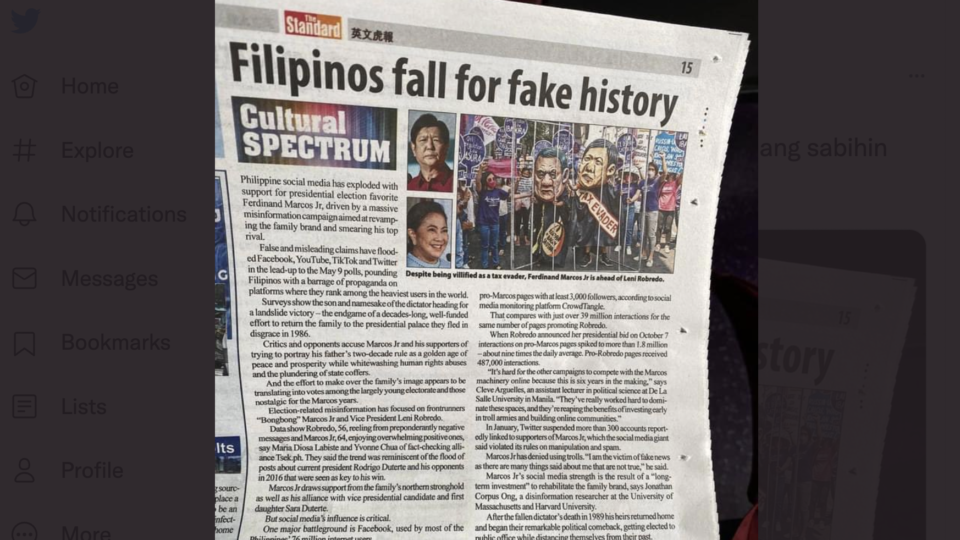Not that we need other countries to point out what’s fundamentally wrong with our inability to discern fact from fiction — or the elaborate disinformation systems that have been put in place to ensure that people stay gullible — but when others begin to affirm our predilection for fake news, then there must really be a problem.
Hong Kong-based English language newspaper The Standard ran a feature under their world news section with a title that practically explains itself: “Filipinos fall for fake history.”
There’s no sugarcoating this. Kulang na lang sabihin nilang ang bobo ng mga Pilipino. pic.twitter.com/MNyytp8yH8
— Gerry Cacanindin (@GerryCacanindin) April 2, 2022
The story, which spanned an entire page, detailed how Philippine social media “has exploded with support for presidential election favorite Ferdinand Marcos Jr., driven by a massive misinformation campaign aimed at revamping the family brand and smearing his top rival.”
“False and misleading claims have flooded Facebook, YouTube, TikTok and Twitter in the lead-up to the May 9 polls, pounding Filipinos with a barrage of propaganda on platforms where they rank among the heaviest users in the world,” the article read.
The article went on to explain that Marcos Jr.’s camp has been criticized of trying to portray the regime of his father, former President Ferdinand Marcos, as “a golden age of peace and prosperity” while whitewashing the well-documented human rights abuses and plunder that took place in the period.
It is estimated that the Marcoses stole an accumulated wealth of US$5 to 10 billion.
Human rights violations recorded during Marcos Sr.’s two-decade rule include 70,000 detained, 34,000 tortured, and 3,240 killed by the military and police.
READ: So what was so bad about martial law?
The article went on to describe the misinformation efforts that appear to be translating into votes among the populace, and how the Marcos machinery had invested early on in building their online sphere of influence to stage a political comeback.
“Election-related misinformation has focused on frontrunners ‘Bongbong’ Marcos and Vice-President Leni Robredo,” The Standard wrote.
“Data show Robredo, 56, reeling from preponderantly negative messages and Marcos Jr., 64, enjoying overwhelmingly positive ones.”
The paper further detailed that social media influence was critical in swaying voters’ opinions, with Facebook as a major battleground — citing De La Salle University political science professor Cleve Arguelles’ analysis that other presidential campaigns would have difficulty competing against the Marcos machinery, as “they have worked really hard (for six years) to dominate these spaces, and they’re reaping the benefits of investing early in troll armies and building online communities.”
A photo of the article, as well as its online version, made rounds on social media.
“There’s no sugarcoating this. Kulang na lang sabihin nilang ang bobo ng mga Pilipino (All that’s missing is for them to say that Filipinos are idiots,” user Gerry Cacanindin wrote on Twitter.
“When Lee Kuan Yew described the Philippines as a ‘soft forgiving culture,’ what he wanted to explain was (what a) stupid culture we have for accepting the Marcoses, allowed (Marcos Sr.) to have a heroes burial and let them come back in power after what they did to our country,” another wrote.
READ: Acclaimed Marcos documentary ‘The Kingmaker’ is now free for streaming



